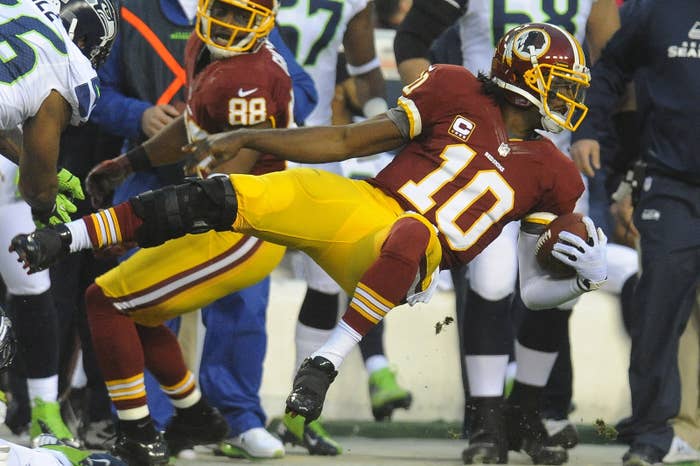
“White people seem to think the word ‘Redskins’ is worse than Native Americans do,” Bob Raskopf told BuzzFeed News on Thursday, fresh off oral arguments in federal court.
Raskopf represents the Washington Redskins — known legally as Pro-Football Inc — in the lawsuit that threatens to strip the team of its trademark registration on the basis that it is disparaging to Native Americans. The team can still use the name if it permanently loses its trademark registration, but without it, anyone can produce merchandise using the name and mascot — which would severely impact the team’s bottom line because it exclusively profits from any sales of the image.
In June 2014, the United States Patent and Trademark Office ruled in favor of the plaintiffs, several Native Americans led by activist Amanda Blackhorse. The office found the name was disparaging.
The Redskins immediately appealed, and on Tuesday morning, both sides argued in front of a judge in Virginia’s Eastern District federal court.
The burden is on the Redskins to prove that the term was absolutely not disparaging to Native Americans at the time when the trademark was issued in 1967, said Jesse Witten, the plaintiffs' lawyer.
Raskopf argued that he has examples of the name used by Native-American teams in the 1970s.
“Here’s what the news says: ‘Apache Redskins beat the Bears,’ and the photo is of two little kids wearing Redskins uniforms and being all happy,” Raskopf told BuzzFeed News. “Where were the activists then? Where are the parents and team organizers saying, ‘I don’t want my kid playing under a Redskins banner’?”
“Of course news media — the Washington Post — don’t like [the name],” said Raskopf. “There’s plenty of sports columnists who have something to say, but it’s just political correctness, not reality.”
Raskopf declined to discuss his understanding of the word in modern context, adding that it’s “not the point” in this case.
“Look at the definition of the word from that time. More than 90% say ‘North American Indian,’ and some say ‘can be disparaging,’ but it depends on how you use it,” he claimed. “We’re not using it to hurt anybody, and everybody knows it, and that’s why the Native Americans are happy with it.”
The trademark registration was stripped once before, in 1992, but was overturned at the district court level because the plaintiffs were slow to file on appeal.
Before Tuesday’s hearing, the judge emailed both sides and asked them to consider Walker v. Texas Division, Sons of Confederate Veterans, Inc., in which the Sons of Confederate Veterans argued that Texas had violated their First Amendment rights by denying them the right to use the Confederate flag on state-issued license plates. On June 18, the United States Supreme Court voted against the Sons of Confederate Veterans, placing heavy emphasis on “government speech.”
For Blackhorse and her co-plaintiffs, that decision strengthened their case against the Redskins legal team.
But Raskopf said that the crux of his argument Tuesday was that just because a trademark registration is government-issued, it is a stretch to believe all registered trademarks are “government speech.”
“A can of Coke is not government speech, and Coke still has federal trademark protection,” he said. “You wouldn’t look at a can of Coke and think, This represents the U.S. government.’”
Judge Gerald Bruce Lee, who heard Tuesday’s arguments and set a tentative trial date for July 27, has yet to determine if a trial will actually happen.
To contest Raskopf’s point that the term Redskins has only recently become considered offensive, Witten referenced a 1972 meeting between Leon Cook, then the president of the National Congress of American Indians — “the largest and oldest civil rights organization for Indians” — and Edward Bennett Williams, who was a part owner of the NFL team at the time.
During the meeting, Cook “demanded the team change their name, the racist fight song lyrics, and the cheerleader uniforms,” Witten said. Williams changed the fight song and the cheerleader uniforms, but the name stayed, and has yet to go. In a declaration filed on behalf of the Blackhorse trademark case, Cook said, “Although Mr. Williams did not at first appear to be receptive to our message, by the end of the meeting, we believe he understood our sincere view that the team name was deeply offensive.”
Much of Raskopf’s argument leans on a 2004 study by the Annenberg Public Policy Center that found that 90% of self-identified Native Americans did not find the name offensive.
The survey has been thoroughly discredited, though, said Witten. He deferred to a blog post by students at the American University Washington College of Law that calls into question the methodology and demographics of the survey.
“It was one question without context in the middle of a survey issued during the 2004 presidential election,” Witten said.
The law students said allowing respondents to self-identify as Native Americans was one particular flaw with the survey. They added that people who identify as “1/16th Cherokee,” for example, often do not have any close ties to their heritage.
Raskopf touted the center’s credibility in conducting polls and said that “very few” people would have “lied” about such ancestry. And even if they did, he said, they would have comprised only a small portion of respondents.
Neither party expects a decision in trial court to be the final word — appeals are already being discussed. And team owner Dan Snyder has said repeatedly that he has zero intent to change the team name voluntarily.
Witten, though, said, “We feel really, really good about our case.”
